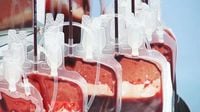The NHS has issued a stark warning as it faces one of the most severe blood shortages in its history, urgently calling for one million regular blood donors to help stave off a potentially catastrophic "red alert". This alert would signify a dangerously low blood supply, threatening public safety and risking delays or cancellations of vital medical procedures across England.
Last July, the NHS Blood and Transplant (NHSBT) service declared an "amber alert" after a cyberattack on London hospitals severely disrupted blood supplies, particularly of the critical O negative and O positive blood types. Since then, stocks have remained perilously low, with only around 785,000 people—roughly 2% of the eligible population—donating blood regularly over the past year. This is well below the estimated need of one million donors to keep the nation’s blood banks healthy and able to meet demand.
Dr Jo Farrar, chief executive of NHSBT, emphasized the gravity of the situation: "Our stocks over the past 12 months have been challenging. If we had a million regular donors, this would help keep our stocks healthy—you’d truly be one in a million." She urged people to book appointments and experience the life-saving impact of donating blood, encouraging repeat donations to maintain supply.
The NHS requires more than 5,000 donations every day, translating to about 1.8 million units annually in England alone. Given the limited shelf life of blood, maintaining a steady flow of donations is crucial. The NHS aims to hold a six-day supply of each blood type, but current stocks hover around two to three days, dangerously close to triggering the "red alert"—a situation never before declared in NHS history.
Such a red alert would force hospitals to prioritize blood use strictly for life-threatening emergencies, potentially postponing routine but essential procedures like cancer treatments and post-childbirth transfusions. Dr Gail Miflin, NHSBT’s chief medical officer, explained on BBC Radio 4’s Today programme that while urgent cases would still be treated, non-urgent operations might face delays: "It can mean, if you're not urgently needing blood, that you may be delayed or have an operation delayed. But if you really need blood you'll still get it."
There is a critical shortage of donors with O negative blood, known as the universal blood type, compatible with any patient and essential for emergency transfusions where blood type is unknown. O negative blood accounts for about 15% of hospital blood use but is found in only 8% of the population, making donors with this blood type especially vital. NHSBT also stresses the urgent need for more donors from Black communities, as around 50% of individuals of Black heritage carry the Ro subtype, which is crucial for treating sickle cell disease—a rapidly growing genetic blood disorder requiring regular transfusions to prevent painful and life-threatening complications.
Despite a notable increase in donor registrations in 2024, only about 24% of new registrants have gone on to donate, leaving a quarter of a million potential donors yet to contribute. NHSBT’s blood director, Gerry Gogarty, warned that filling available donation slots, particularly in town and city centres, is essential to avoid the red alert and maintain the blood supply needed for the NHS to function effectively.
Joining the NHS’s call for donors is four-year-old Isaac Balmer from Hull, who receives blood transfusions every 12 weeks due to hereditary spherocytosis—a genetic condition causing fragile red blood cells to break down prematurely, leading to severe anemia. Isaac affectionately calls the transfused blood "Hulk blood," imagining it makes him stronger and healthier. His mother, Jasmin Suggit, a newborn hearing scanner at the hospital, shared the emotional rollercoaster of Isaac’s condition: "His haemoglobin levels fluctuate, and when they drop significantly, he becomes lethargic and jaundiced. But when he receives his transfusion, you see the colour return to his cheeks, and his energy levels soar before our eyes. It is incredible." Jasmin described blood donors as "real life, everyday superheroes" who keep Isaac and many others alive through their generosity.
Health Minister Baroness Merron expressed deep gratitude to regular donors while underscoring the urgent need for more people from all backgrounds to donate. She highlighted government efforts to make donating easier, including opening new donor centres and increasing appointment availability closer to people’s homes. "The NHS is in urgent need of more lifesaving blood donors from all backgrounds," she said.
Currently, there are 26 permanent NHS donor centres located in major cities such as London, Manchester, Birmingham, and Bristol, with mobile teams collecting blood at community venues like church halls. Men are eligible to donate every 12 weeks, while women can donate every 16 weeks, though some calls have been made to review these intervals to boost supply.
Blood donations are vital not only for emergencies like trauma and childbirth but also for scheduled surgeries—including cancer operations and transplants—and for patients with chronic blood conditions such as sickle cell disease, thalassemia, and leukemia, many of whom require regular transfusions to survive.
The NHS’s longest-ever amber alert has been in place since July 2024, and with blood stocks still low, the looming threat of a red alert serves as a stark reminder of the fragile balance that sustains the healthcare system. NHSBT and health officials continue to appeal to the public to step forward and donate blood, emphasizing how a single donation can save up to three lives.
For those interested, appointments can be booked online via the NHS Give Blood website or the GiveBloodNHS app, or by calling 0300 123 23 23. Every donation counts, and with the nation’s blood supply hanging in the balance, the NHS’s call is clear: become one in a million and help keep the lifeblood flowing.



